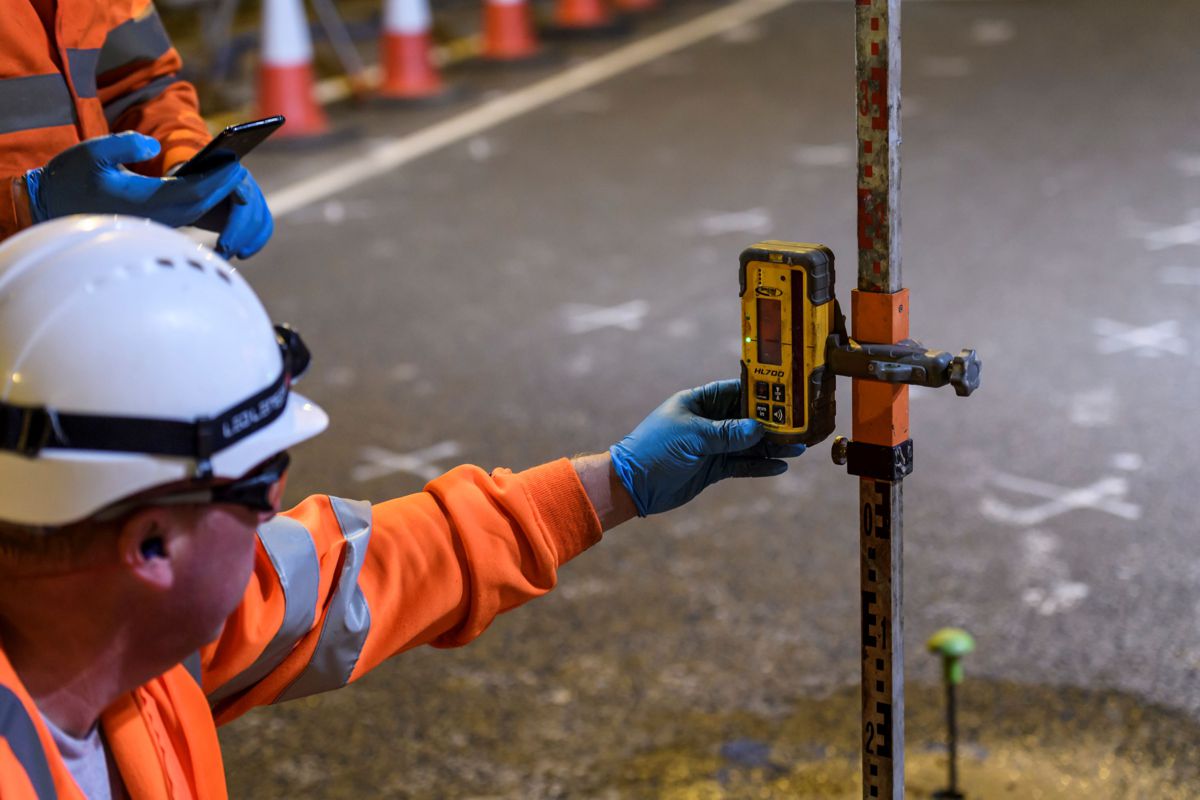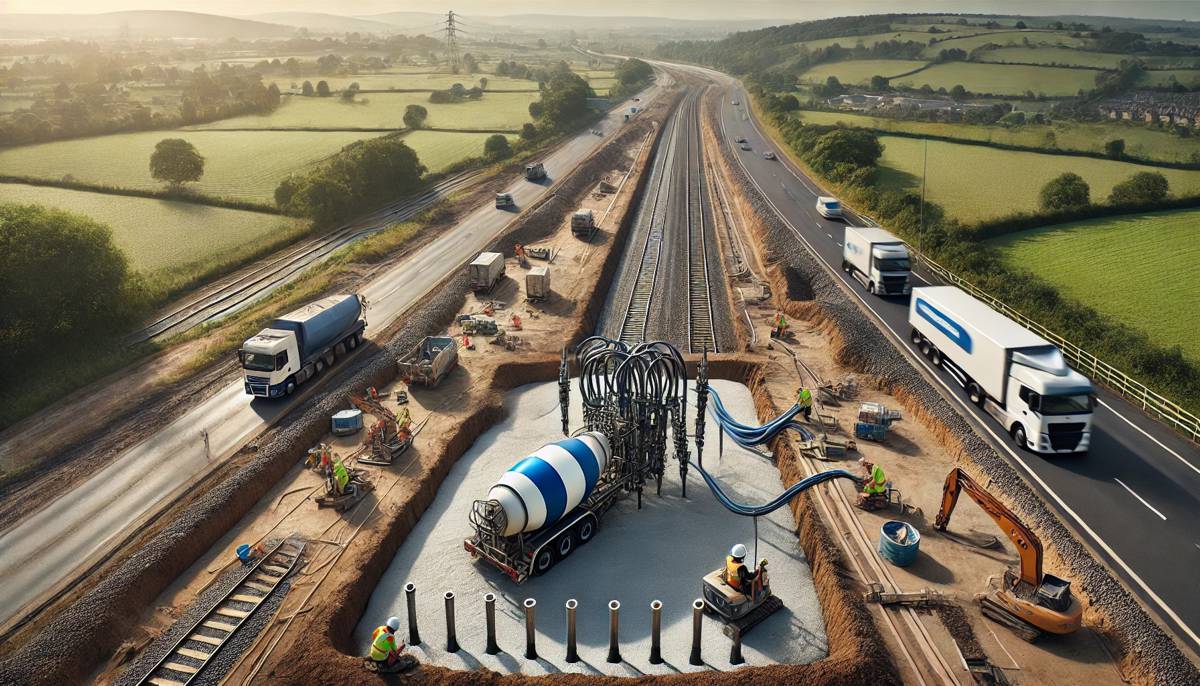Geobear celebrates HAPAS Certification for Subsidence Solutions
Geotechnical innovation has just reached a new milestone in the UK with Geobear securing the coveted Highways Authorities Product Approval Scheme (HAPAS) certification. The accolade not only sets a new benchmark in the ground stabilisation sector but also positions Geobear as the first and only company in the UK using geopolymer solutions to receive this esteemed approval.
The HAPAS certification isn’t just a rubber stamp; it’s a testament to the quality, safety, and sustainability of the products and technologies used in critical infrastructure projects across the UK. In this case, Geobear’s geopolymer ground stabilisation solution has now been recognised as fit for purpose on UK highways projects. But what does this mean for the broader construction and infrastructure industries? Let’s dive in.
What is HAPAS Certification?
HAPAS was introduced by the British Board of Agrément (BBA) in 1998 to provide assurance that new technologies and products for highways meet the rigorous standards necessary for use on public roads. It’s a critical gatekeeper, ensuring that innovative solutions like Geobear’s geopolymer injection technology meet the demanding requirements of the UK’s transport infrastructure. For Geobear, achieving this certification represents not only a seal of quality but also an entry into the exclusive circle of HAPAS-approved solutions.
Geobear’s HAPAS certification means their solutions have passed through a stringent approval process involving exhaustive testing, site trials, and performance assessments. These rigorous protocols ensure that products can be reliably used in UK infrastructure, offering long-term durability, sustainability, and safety. For clients, this certification offers peace of mind, knowing they’re working with technologies that have proven to meet highway industry standards.
Subsidence is a Growing Concern in the UK
Let’s take a step back and consider the bigger picture. Subsidence, one of the most costly geohazards in the UK, is an issue that threatens not just property owners but also critical infrastructure like roads, railways, and bridges. The British Geological Survey has estimated that subsidence-related issues have cost the UK economy an eye-watering £3 billion in recent years, and with climate change exacerbating extreme weather patterns, the problem is expected to grow.
Subsidence occurs when the ground beneath a structure collapses or sinks, often due to soil erosion or other environmental factors, leading to cracked walls, uneven foundations, and in some cases, catastrophic failure of structures. Traditional methods to combat subsidence are often costly, labour-intensive, and highly disruptive, requiring heavy machinery and large-scale excavations.
Geobear’s geopolymer solution offers a non-invasive alternative. Instead of excavating or rebuilding, their technology uses small steel tubes to inject a geopolymer resin deep into the affected ground. This resin quickly expands to fill voids, strengthening the soil and supporting the structure above. The process is monitored in real time using laser levels, allowing for precise adjustments and a customised solution for each site.

Why Geopolymer Technology is a Game-Changer
Geopolymer injection technology isn’t exactly new, but Geobear has taken this innovative approach to ground stabilisation to new heights with their HAPAS-certified solution. Here’s why this technology is turning heads in the construction and infrastructure sectors:
- Minimal disruption: Traditional methods involve heavy machinery, large-scale excavations, and a lengthy construction period. Geobear’s method can be applied using small equipment and carried out without significant disruptions to surrounding areas, making it ideal for live environments, including highways, railways, and residential zones.
- Sustainability: The geopolymer resin used by Geobear is designed to have a low environmental impact, offering a sustainable alternative to more invasive methods. Plus, the technology uses fewer resources overall, helping companies reduce their carbon footprint.
- Cost-effective: By eliminating the need for major excavations or reconstruction, Geobear’s solution can save time and money. The technology provides a quick fix without compromising on long-term reliability.
- Versatility: While subsidence is a big issue in urban areas, Geobear’s solution can be applied in a range of infrastructure projects, from highways and bridges to railways and buildings.
The Role of Climate Change in Rising Subsidence Risks
Subsidence risks are on the rise in the UK, and it’s not just because of shifting soils or aging infrastructure. Climate change is playing an increasing role in exacerbating this already costly problem. As the UK experiences more extreme weather patterns — from prolonged dry spells to torrential downpours — the soil beneath our infrastructure is subject to greater stress.
“The HAPAS certification is a major achievement for Geobear,” says Simon Hughes, Geobear’s UK Managing Director. “We want to ensure that our clients are receiving a quality solution, and being the first in our sector to receive this accreditation means we can deliver to this important standard. This will enable us to develop further into UK markets where we are eager to grow, including infrastructure.”
The increased frequency of extreme weather events means that innovative solutions like Geobear’s will be vital for keeping Britain’s roads, railways, and buildings standing strong. As the climate changes, the need for sustainable, long-lasting solutions becomes even more crucial.
Expanding into the UK Market
With their new HAPAS certification, Geobear is now well-positioned to expand its reach across the UK. Their solution is already widely used in various infrastructure projects across Europe and Asia, and now with HAPAS approval, they can offer peace of mind to UK clients in the public and private sectors alike.
The company is already in discussions to expand its footprint in the UK infrastructure sector, with potential projects in highways, bridges, and public buildings in the pipeline. The certification opens up a range of possibilities, particularly in government-funded projects that require HAPAS-certified solutions for tender eligibility.
Geobear’s commitment to innovation, quality, and sustainability makes them an attractive option for businesses and public bodies looking for cost-effective and environmentally friendly solutions to subsidence issues. And with the threat of subsidence only set to rise, they’re stepping in at just the right time.
A Step Forward in Infrastructure Resilience
In a world where climate change is rapidly altering the landscape, and subsidence is becoming a bigger and more costly issue, Geobear’s HAPAS certification is more than just an achievement; it’s a necessity for the future. With a proven track record in ground stabilisation and a commitment to sustainability, Geobear is leading the charge in providing innovative, low-disruption solutions to the UK’s growing infrastructure challenges.
Their success marks a major step forward not only for the company but for the entire geotechnical industry. As the UK grapples with the evolving needs of its infrastructure, solutions like Geobear’s will undoubtedly play a crucial role in keeping the country’s roads, railways, and buildings safe, secure, and resilient for decades to come.




















